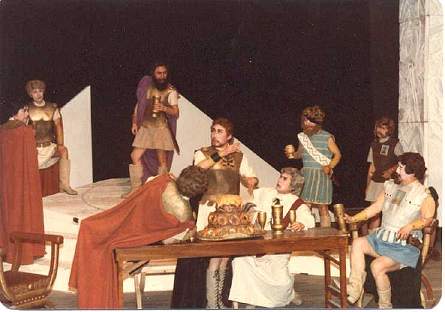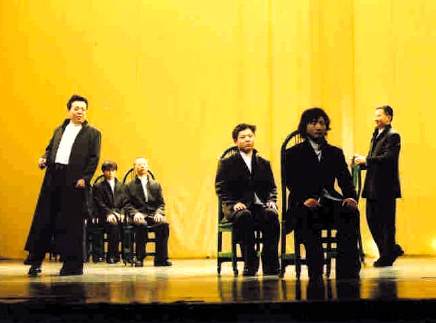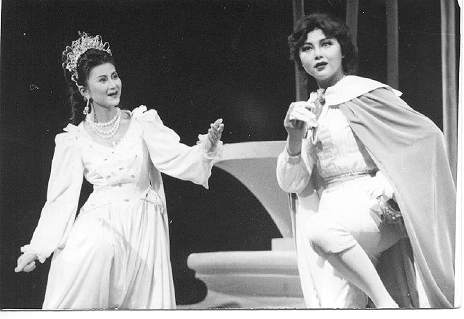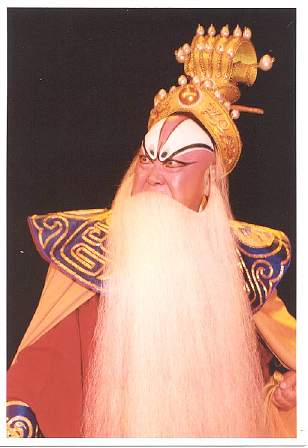Shakespeare in China: Old Man Sha in the Middle Kingdom
- Introduction: Diverse Faces of Shakespeare in China
- The Early Years
- Spoken drama: Shakespeare since the 1970s
- Modern experimental productions
- Sinified Shakespeare
- Conclusion
- Bibliography
Introduction: Diverse Faces of Shakespeare in China
|
"Foreign Shakespeare" performances in different cultures offer new perspectives on the understanding and interpretation of the plays, and illustrate the ongoing cultural exchanges between the playwright and the indigenous theatres as well as their audiences. In China, the majority of Shakespeare productions have been in the huaju or spoken drama form, the modern style of theatre which was developed early in the twentieth century on the model of contemporary Western theatre. Customarily, huaju performances of Shakespeare have attempted to imitate Western appearance in scenery, costume and make-up, including coloured wigs and prosthetic noses, as in this production of 1984. |
 Antony and Cleopatra (1984), translated by Zhu Shenghao, directed by Hu Weimin, produced by the Shanghai Youth Spoken Drama Company. Courtesy of Fang Ping. |
|
However, some recent huaju Shakespeare productions have broken with this convention: |
|
 Richard III (2001), directed by Lin Zhaohua, produced by the Lin Zhaohua Workshop, Central Experimental Spoken Drama Company and the Arts College, Sun Wen University. Courtesy of Lin Zhaohua. |
|
|
By contrast with huaju, where the spoken language is the basis of the dramatic form, in sinified Shakespeare productions the original plays have been adapted into genres of the traditional Chinese music theatre, xiqu, where the focus of the performance is on aria singing, dance, mime and acrobatics. Whereas some sinified productions adopted certain spoken drama conventions, with performers pretending to be Westerners and telling the story in a Western way, |
 Twelfth Night (yueju, 1986), adapted by Zhou Shuihe, directed by Hu Weimin & Sun Hongjiang, produced by the Shanghai Yueju Theatre's Company No. 3. Courtesy of Sun Hongjiang. |
| others have used Shakespeare's plays as a resource from which to create Chinese stories with Chinese characters, as in this production of King Lear. | |
 King Qi's Dream (jingju adaptation of King Lear, 1995), adapted by Wang Yongshi, directed by Ma Ke, produced by the Shanghai Jingju Theatre. Courtesy: Shanghai Jingju Theatre. |
|
There has also been a Shakespeare performance in the Western operatic style by a Chinese composer. (VIDEO Troilus and Cressida) The photographs and video extracts offered by this article are intended to give viewers a representative sample of such diverse approaches to presenting Shakespeare on the Chinese stage.
